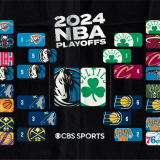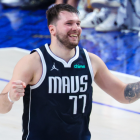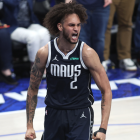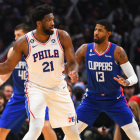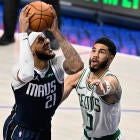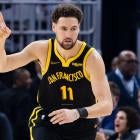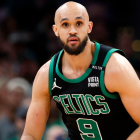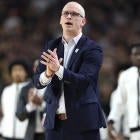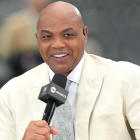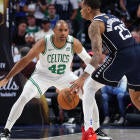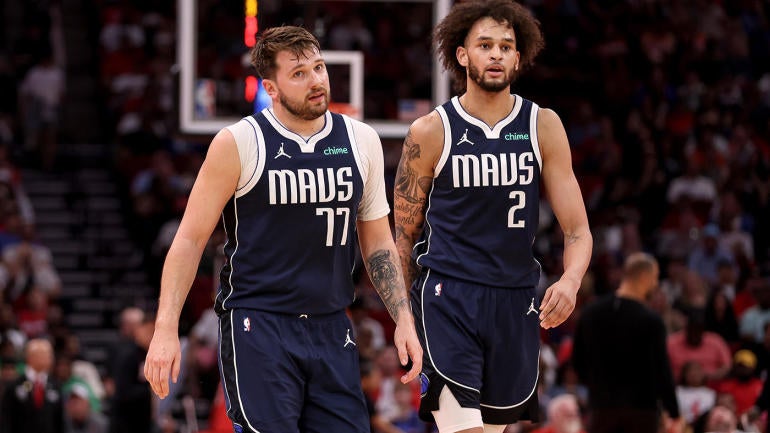
The Dallas Mavericks tanked the final two games of last season, which is why they're in the Western Conference finals right now. It's not the only reason; you can point to the Kyrie Irving trade and the deals to bring in PJ Washington and Daniel Gafford at the deadline this year as important touchstones, too. But that tank job was the start of a chain reaction that got them here because it landed them Dereck Lively II.
A year ago, the Mavericks were still mathematically in the running for the final play-in spot in the Western Conference. They were one game back of the Thunder for the No. 10 spot with two games left to play. And with OKC holding the tiebreaker, they needed to win out and for the Thunder to lose their last game to a Grizzlies team that didn't play a single starter. So yeah, they had a chance, but not really. To add even more context to the situation, the Mavericks had a top-10 protected pick in the 2023 Draft on the line, and had they made the play-in that pick would've likely fallen out of the top 10 and been sent to the New York Knicks. Weighing both scenarios, the Mavericks punted the last two games by starting guys like Frank Ntilikina and Davis Bertans. They lost both, improving their odds of keeping their first-round draft pick in June.
The Mavericks were heavily criticized for the decision. My CBS Sports colleague Brad Botkin called the tanking "shameful." In a season where you trade for Irving to compete for the postseason only to wave the white flag, I get how that is an awful look. But two things can be true: the Mavericks can be smart for prioritizing keeping a draft pick, while also being a disgrace for intentionally trying to lose, which is the exact opposite of what sports are about.
But had they not tanked, Dallas wouldn't have been able to draft Lively with the 12th overall pick, and if they didn't have him, the Mavericks wouldn't be in the Western Conference finals right now. Entering the draft, Lively was seen as a raw prospect in need of some refining, but possessed stellar athleticism and length, making him the perfect rim-protecting, alley-oop catching big Dallas needed to pair with Irving and Luka Doncic. He's received praise for his fast development, and in Dallas' Game 1 win against the Timberwolves, he showed -- again -- why the Mavericks were so shameless in tanking last year.
In the fourth quarter, with Minnesota up 102-98, Lively grabbed an offensive rebound that ignited an 8-0 run, which ended up winning Dallas the game. It was his fourth offensive board of the game, and it led to a wide-open 3-pointer by Luka Doncic, who retook the lead for the final time to steal a win on the road.
If you've watched Lively II throughout this postseason run, then seeing him getting those offensive boards is nothing new. In fact, I wrote about how crucial his offensive rebounding would be in this series prior to Game 1. His aggressiveness on the offensive glass is what won the Mavericks Game 6 against the Oklahoma City Thunder, avoiding a win or go home Game 7 and sending the No. 1 seed packing.
Lively finished Game 1 against the Wolves with a game-high +19, and he's shooting 60.6% from the floor, which ranks third amongst centers in the playoffs. When he's on the floor the Mavericks outscore opponents by +6 points this season, which ranks in the 91st percentile at his position. He's not putting up monster numbers, but the fact that he's managed all that while coming off the bench for all of Dallas' playoff games is insane not just by rookie standards but for any player in the league.
He's shown shades of Tyson Chandler, which isn't surprising since the former Mavericks center has been mentoring Lively throughout this season. During Dallas' first-round playoff series against the Clippers, Lively said of Chandler, "Words can't even describe how much he's helped me." Back in October, Chandler said he was impressed by how advanced Lively was before even playing his first NBA game.
"He's savvy down there when he catches the ball," Chandler said via the Dallas Morning News. "He's not rushed. He's getting into his moves, shooting his hooks. A lot of times young players get down there and turn the ball over because they're moving too fast. He's getting down there comfortably, seeing what he's supposed to be looking at, deciphering when to get rid of the ball or go make a play. That all happens so fast, it normally takes a little while to learn. But he's picking it up, I would say, faster than anybody I've seen at his age."
Lively may be coming off the bench for Dallas, but he's been more impactful than Gafford on several occasions. The two are getting the same share of minutes, but it was clear in Game 1 that the Mavericks may need to lean on Lively a bit more because of his aggression in crashing the offensive glass, his ability to put the ball on the floor and not turn it over as much and being able to pass cleanly out of the paint. His size -- standing at 7'1 -- and strength also matter significantly when defending the twin towers of Rudy Gobert and Karl-Anthony Towns. He's also far more mobile than Gafford, using his length and athleticism to get out to the 3-point line to close on a shooter when needed.
When the Mavericks tanked those two games last season, I don't think they envisioned that whoever they picked would make this much of an impact so quickly and in such huge moments. But Lively's play has been crucial in this surprise playoff run. He's been a seamless fit on offense, and essential on defense.
There's no way of knowing a year ago how this would've panned out for the Mavericks, but had they not tanked to land what appears to be a franchise center in Lively, they almost certainly would be watching the West finals from home right now.













